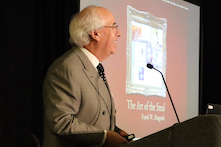Association News: Keynote speaker Frank Abagnale shares tips for avoiding fraud and cybersecurity risks - at FGIA Hybrid Annual Conference
Posted on March 3rd, 2022
 The Fenestration and Glazing Industry Alliance (FGIA) heard fraud prevention advice from scam artist-turned-Federal Bureau of Investigations educator, Frank Abagnale, during his keynote address at the 2022 FGIA Hybrid Annual Conference. Abagnale, whose life inspired the movie "Catch Me If You Can," worked several fraud scams in his youth and was eventually asked by the FBI to teach prevention and verification tactics to agents. He has done so for 46 years.
The Fenestration and Glazing Industry Alliance (FGIA) heard fraud prevention advice from scam artist-turned-Federal Bureau of Investigations educator, Frank Abagnale, during his keynote address at the 2022 FGIA Hybrid Annual Conference. Abagnale, whose life inspired the movie "Catch Me If You Can," worked several fraud scams in his youth and was eventually asked by the FBI to teach prevention and verification tactics to agents. He has done so for 46 years.
"My philosophy is: prevention, verification and education," said Abagnale. "Education is a powerful tool to preventing crime." He said the pandemic led to an increase in both identify theft losses and "romance" scams. "We saw record compromises or breaches in 2020," Abagnale said. "Every breach occurs because someone did something they weren't supposed to do, or they failed to do something they were supposed to do, creating an open door for a hacker."
Abagnale cited a 2012 study of 40,000 children, which found that 10 percent of them had been victims of identity theft. Children have no credit so their identities can be stolen and used for years without anyone noticing, he noted. Public records can serve as valuable resources for identity thieves, along with social media. "Scammers can use social media to gain information to create more custom and sophisticated phishing scams," he said. "Phishing emails are nothing more than social engineering."
Abagnale advised participants to look for "soft spots" in their offices and even homes. "There are soft spots everywhere," he said. "Criminals are not looking for challenges, but opportunities. They will find soft spots in your building or home. And now everything is connected to the internet."
Abagnale predicted the inevitable demise of using passwords, as they are a large liability to security. "I hate passwords," he said. "Sixty three percent of network intrusions are due to compromised user passwords."
With social media, Abagnale recommended thinking twice about what one posts. "Never tell anyone or share your date of birth or where you were born," he said. "What you say on Facebook stays on Facebook. And Facebook puts together everything from your gender, age, ethnicity, sexual orientation and more."
Abagnale offered three tips for how to protect yourself:
1. Don't just shred old files. Destroy records with a security microcut shredder, specifically.
2. Freeze credit. Once it is frozen, no one can see it without permission. "Everyone should do this," he said. "But you should still use a credit monitoring system."
3. Don't use a debit card. "Credit cards are safest," said Abagnale. "With credit cards, you are never using your own money, unlike with a debit card. Your credit card company will reimburse you for fraudulent charges. If you use Venmo or Zelle, back it with a credit card, not a debit card."
Abagnale said $37 billion is stolen every year by scammers targeting elderly adults. "Any time anyone is telling you that you have to pay immediately, that is a giant red flag," he said. "Another is when they ask you for information. Romance scams rely on that too. Romance scams can go on for a year before anyone asks for any money or suggests they might need money."
For more information about FGIA and its activities, visit FGIAonline.org.
Your trusted industry resource, setting the standards for fenestration and glazing.
###
